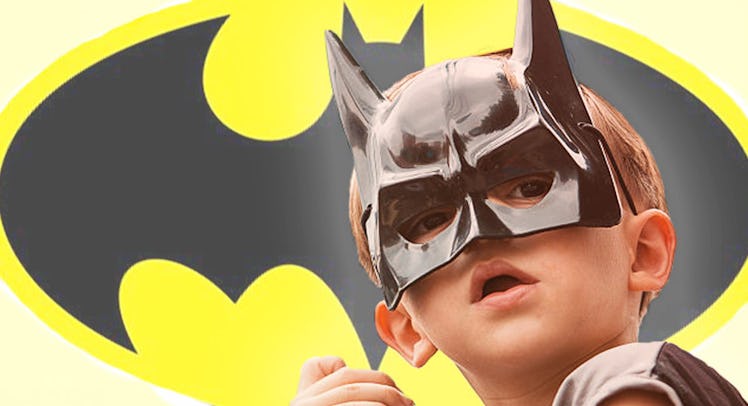Kids Who Pretend They’re Batman Are Ahead Of The Perseverance Curve
Want your kid to do better in school? Buy a cape.

Young children may improve their focus in school by pretending they’re Batman, according to research published in the journal Child Development. The results suggest that kids are more equipped to persevere in the face of boring yet important tasks when they can be the hero Gotham deserves — or rather, when they can try on a different identity.
“When they look at a situation from someone else’s perspective, it could help them to see that problem in different ways and, in turn, that could help them find better solutions,” study coauthor Rachel White of the University of Pennsylvania told Fatherly.
With the exception of studies conducted in the 1970s, research on how children develop perseverance is sparse. Most notably during this time, the Stanford Marshmallow Experiment linked children’s ability to delay gratification (in this case, eating a marshmallow) with future successes. Interestingly, researchers found that children who were able to resist the temptation to eat their marshmallows claimed that they did so by imagining that the treats were clouds or pets in order to shift perspective. And that makes sense, because data on young adults similarly suggests that shifting one’s immediate perspective to a more distant objective can helps individuals attain their goals. Most recently, research revealed that when preschoolers pretended they were Batman, it improved executive functioning. This odd finding prompted White and her colleagues to test what they call the “Batman Effect” in a larger group of children.
To do this, they recruited 180 children between the ages of four and six, and randomly assigned some them to imagine they were Batman (they even provided capes). Other children were asked to act like themselves, sans costume. Children were then introduced to a fun iPad game, and also asked to complete an activity on a —designed to require their undivided attention, and to be long and boring. Subjects were told that they could take a break from their work to play the fun game whenever they wanted.
Older children spent more time on the boring task than younger children, and kids spent more time on the fun game than the tedious ones. Surprisingly, however, children dressed as Batman spent the most time on the boring task—about 55 percent for 6-year-olds, 32 percent for 4-year-olds (this was not related to their baseline scores for mental control, memory, or empathy). Conversely, 6-year-olds acting as themselves stayed on-task only 35 percent of the time. Four-year-olds only did so 20 percent of the time.
“Imagining that they’re Batman or another competent, hardworking person could lead children to work harder because they take on the qualities of that character,” White speculates.
White suspects the “Batman Effect” it’s a combination of distraction and mirroring aspirational qualities and is focusing her future work on sussing out the particulars of that distinction. Her preliminary findings suggest that it does matter who children pretend to be. For instance, if a kid takes on the persona of Dash from The Incredibles, a character with impulse control problems, they might not experience the same results as a tiny, diligent Batman.
Regardless of why it works, the findings yield a fun and simple way parents and educators can foster perseverance through pretend. Because let’s be honest—your kids kind of want to wear capes to school anyway, so they may as well reap the academic benefits. And hey, if your kids end up building Bruce Wayne-style billionaire empires one day, they’ll have you and your unconventional parenting to thank.
Maybe you’ll get to retire early.